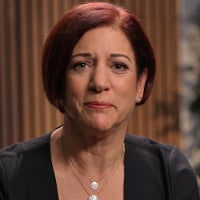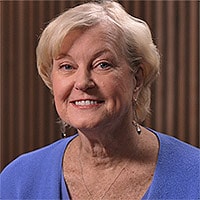Transcript
This transcript has been edited for clarity.
Deborah L. Toppmeyer, MD: Hello. I'm Dr Deborah Toppmeyer. I'm the director of the Rutgers Breast Care Center and also the chief medical officer of Rutgers Cancer Institute of New Jersey. Joining me today for this Care Cues conversation is Lisa Maul, a retired executive and two-time breast cancer survivor. Welcome, Lisa.
Lisa Maul: Thank you. Thanks for having me.
Toppmeyer: So, Lisa, tell us about your recent diagnosis. How was that diagnosis made?
Maul: Oh, boy. Well, I certainly wasn't expecting this. I had a lump in my breast that I was concerned with. I'd actually had a mammogram and it came back clear. Everything was fine. But I could feel it. So I ended up going to a local hospital and got the biopsy and all that. And I got a phone call saying that the doctor would like to see me in her office tomorrow.
So I knew that was not good. I immediately called you and explained that I think I have cancer again.
Toppmeyer: With your first breast cancer, you were treated with a lumpectomy and a sentinel node. And then you were treated systemically on a clinical trial because you had a certain subtype of breast cancer called triple negative.
Maul: And for that, I didn't have a choice. My daughter and son were 5 and 7. And life was all about them; it was about Saturday morning soccer, and it was about getting their homework in or taekwondo and dance and everything else.
Evolution in Shared Decision-Making
Toppmeyer: When you contrast your initial diagnosis in 1999 and your more recent breast cancer diagnosis — both early breast cancers — do you feel that the shared decision-making was different?
Maul: So this time, the cancer was in both breasts, and it was a different type than what I had originally. So, once I saw you, we realized that it was going to have to be a double mastectomy. There was no question about it.
But what was also important for me was the team, and the communication between you all was so important for me because I could talk to them. I mean, even with the plastic surgery, I had a choice of options. So that was good that we could talk about it. And then I didn't just say, okay.
Toppmeyer: Talk about part of the adjuvant treatment and when you started doing some research into ribociclib.
Maul: I went home and googled it. And Google says that it's for stage IV metastatic breast cancer patients to extend their life. And I'm freaking out because it's like, the next time I see you, is there something you're not telling me? Why would I be taking this medication?
Toppmeyer: Right. That's exactly what you said to me. And, actually, it was a teachable moment for me because obviously, yes, you were looking at the metastatic data, but I had not been clear enough about the early breast cancer data. And you have early breast cancer, and you are taking the ribociclib adjuvantly with your hormonal therapy.
But that changed how I explain this class of agents to patients with early breast cancer because we need to be aware that patients are going to google things. And we have a filter that patients may not have.
Communicating Treatment Side Effects
Toppmeyer: So, Lisa, how well-informed and confident were you in the treatment plan and your decision to follow that treatment plan?
Maul: Very confident, as far as what the recommendation was. But I really am very aware of what any side effects could be. And I'm not just okay if something is persistent. I would talk to you about it.
Toppmeyer: Sometimes patients get so overwhelmed with the laundry list of potential side effects that we discuss with them, and I really try to communicate, "Although these are listed, here is what is common."
That's why part of that communication, which I think is critical for providers, is to put things in context — what's common, what's rare, but here's the whole platter of potential side effects.
Maul: But telling me that was so important because when you told me what some of the side effects were going to be, when I had them, it was like, oh, okay, this is normal. It was just like, okay, this too shall pass. What I needed was to be able to, one, be on the drug, but also talk to you about it to see what else we could do.
Deb, how do you handle new patients? How do you assess how you're going to communicate with them, what your style would be?
Toppmeyer: I think the approach really has to be tailored to the person in front of you. You really need to be able to read the room and change how you approach and how you communicate, based on the patient you're seeing in front of you and on their family members. I always introduce myself as "Deb Toppmeyer." I don't say "Dr Toppmeyer."
Cancer is very scary. You're talking about chemotherapy, you're talking about radiation. And I make sure that a patient feels heard and that they have the opportunity to ask all the questions that they want. If I'm running a little behind, I will sit there and talk to the patient and say, "I have all the time in the world for you." A physician's hand on the doorknob trying to exit — that doesn't welcome more conversation.
And I think what I have learned over the years are those cues and body language, like sitting. I always sit down and speak to a patient; I don't stand over them. And this is so critically important because people really want to be heard.
Maul: Yes.
Tailoring Patient Communication
Toppmeyer: With all our advances in the treatment of cancer, the good news is people are living longer because of these treatments. But how do you perceive survivorship? And what can we do to make this journey better for you?
Maul: I think part of it is getting back to my normal norm, but knowing that there are always going to be advances that I can talk to you about. That's why I think it is really important that I keep seeing you.
Toppmeyer: I'm not getting rid of you.
Maul: But the reality of survivorship, too, is taking care of myself and noticing things, not settling for knowing I had a lump and then saying it was normal. No, this isn't normal.
Toppmeyer: Right. And I tell patients that all the time and when I’m giving talks: You know your body well.
But I think sometimes we as oncologists focus so much on the disease, we forget the long-term side effects of some of our therapies, in terms of hot flashes, decrease in bone mineral density, sexuality issues.
Maul: I was complaining about my knee and I said, "But with everything going on, I haven't done anything about it." And you're like, "Get it fixed. You're living, girl."
Toppmeyer: For you as a patient in your sixties vs you as a patient in your young forties, you probably look at the world somewhat differently.
Maul: Absolutely. Now I have a grandson.
Toppmeyer: Congratulations!
Maul: There's so much life ahead of me. And that's how I'm looking at it now. I'm going to do everything I can. But also, I'm not fearful at all. I'm just not.
Toppmeyer: This has been a great conversation today, Lisa. It's really been so informative.
Maul: Thank you so much for having me. It's just been a pleasure.







